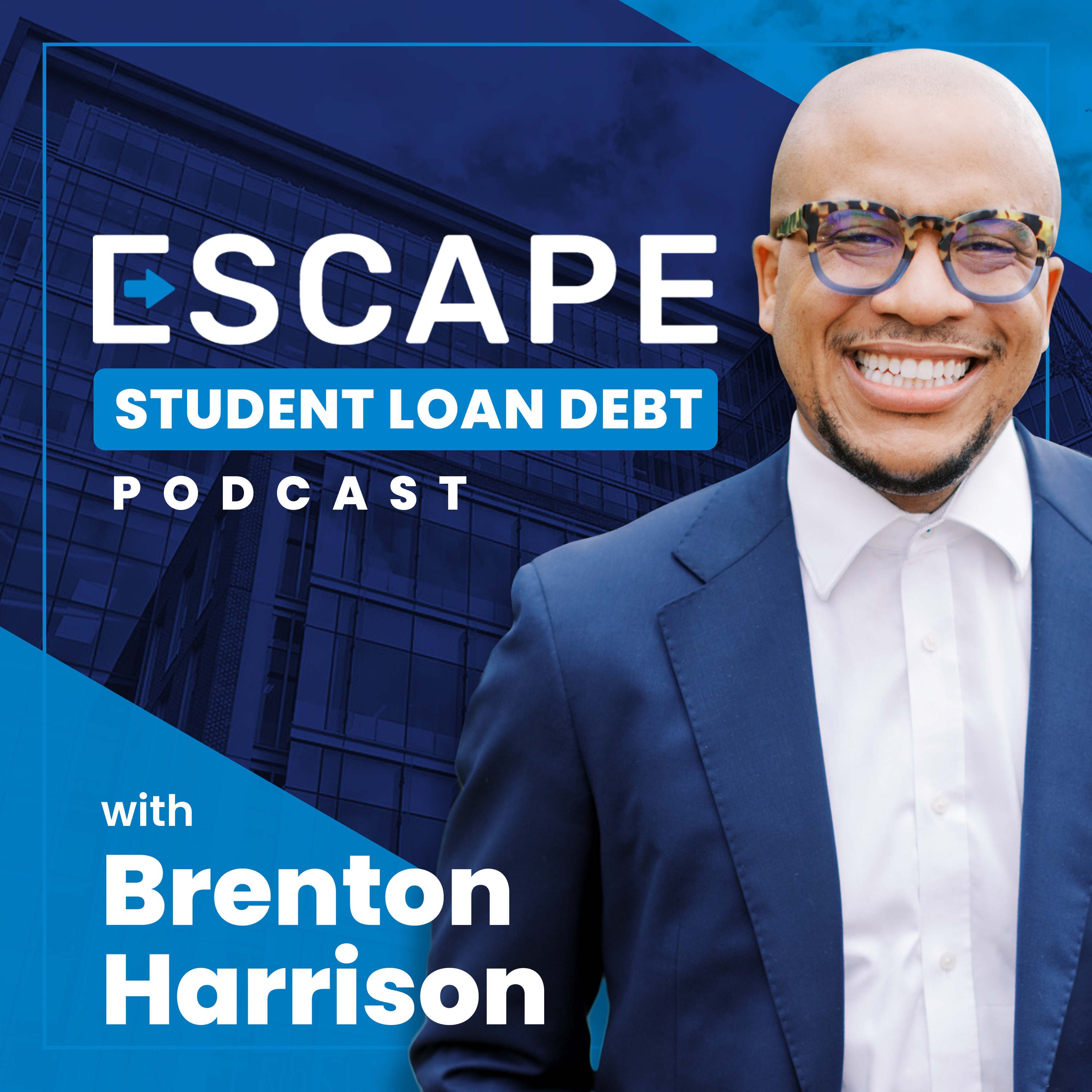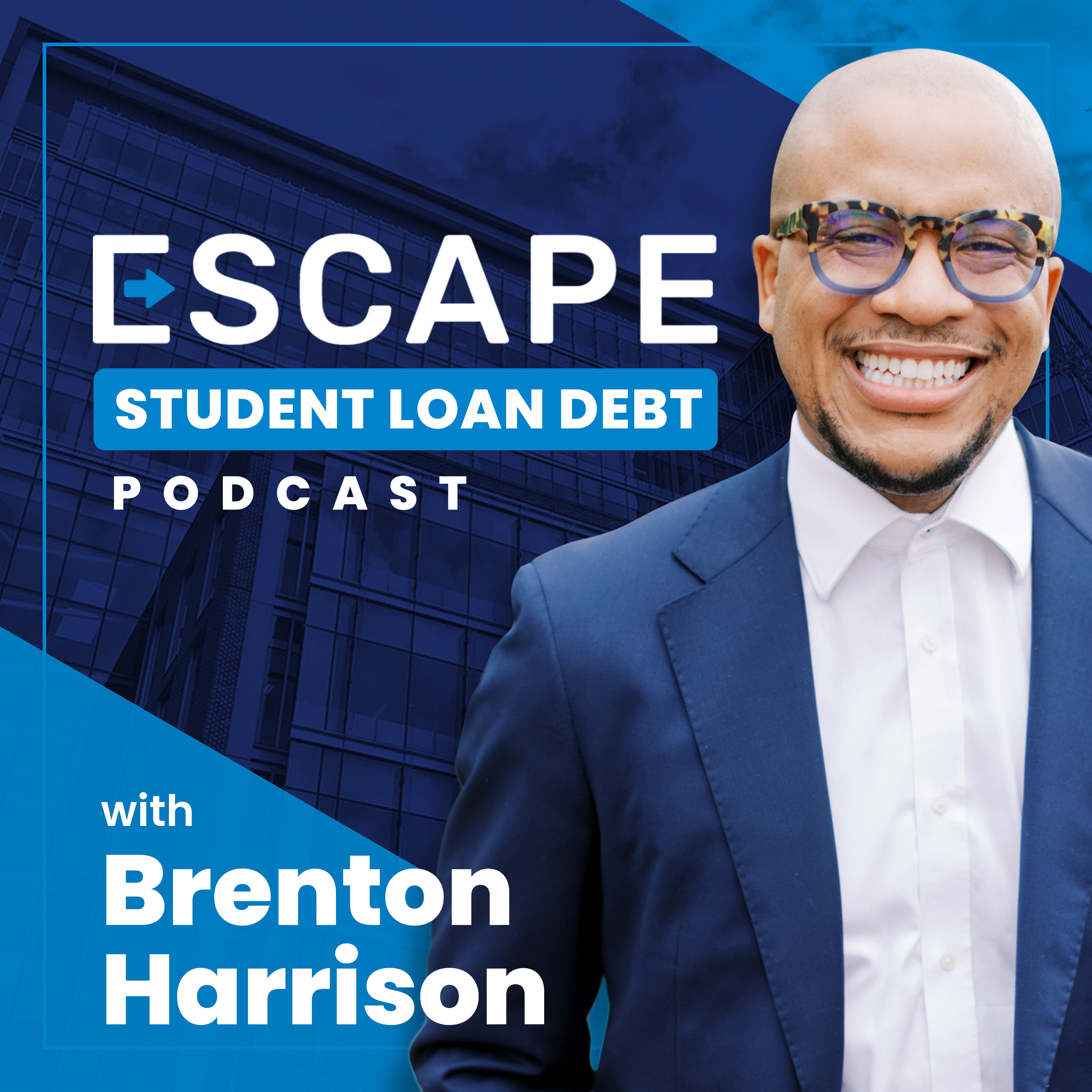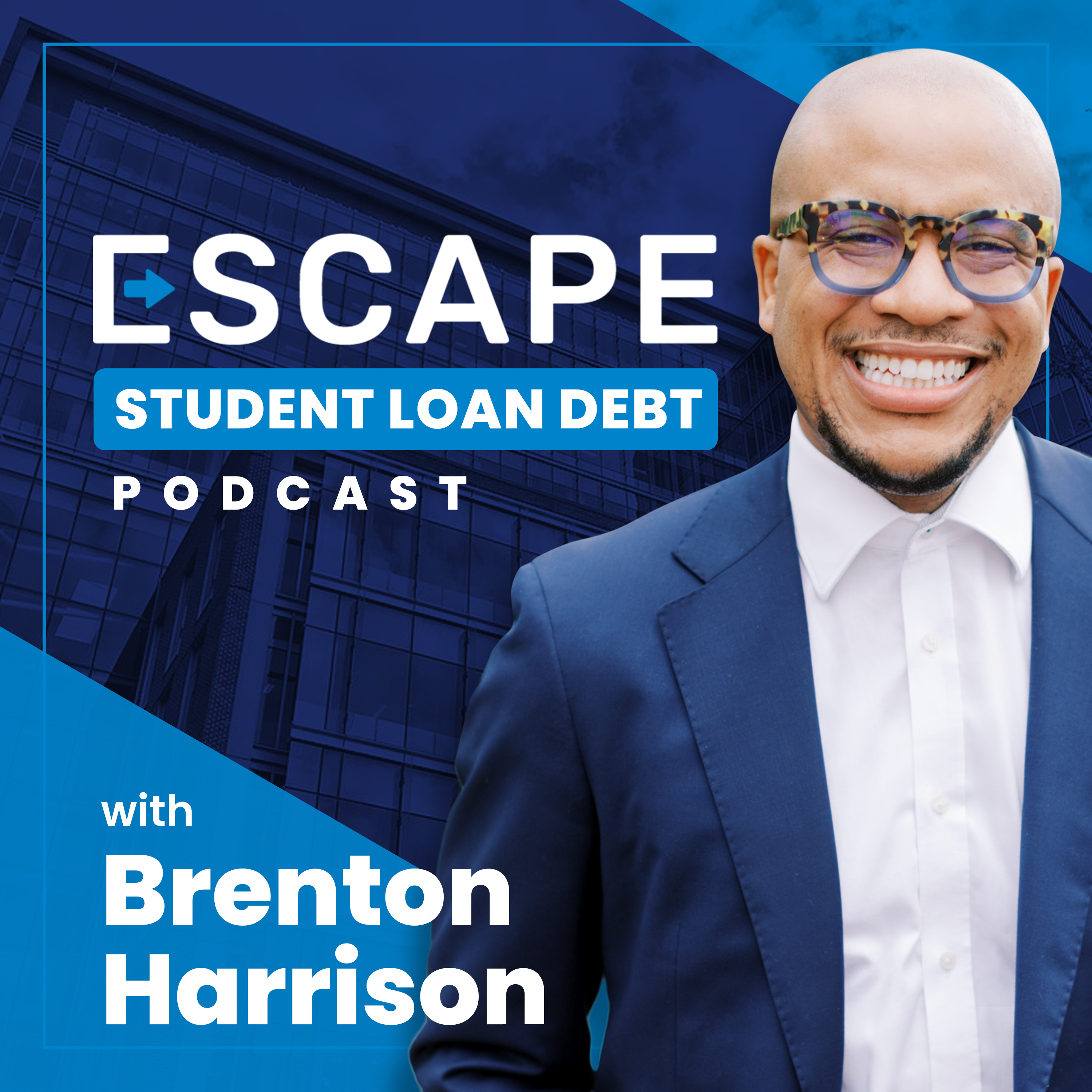Episode Transcript
[00:00:00] Speaker A: In this episode we share the latest updates for the Save Plan, what you should do about it, and what it may mean for the future of all income driven repayment plans. Let's get started.
Are your student loan payments or loan balances a major obstacle in your financial life? Then tune in and let's Escape Student Loan Debt.
Hello, my name is Brenton Harrison of Escape Student Loan Debt and your host for the Escape Student Loan Debt podcast. This episode is coming to you on the heels of recent updates on the lawsuits that are attacking the Save Plan in the courts that you're seeing across this country. And I will tell you that when we have had episodes in the past where we get into the legalities and legal standing that I compared to some other people in the student loan space, am not a person who watches congressional hearings. I'm not a person who watches court updates and gets too deep into the comings and goings of different lawsuits. I try to focus more on what does this mean after the information has come out. So this episode is going to be a little blend of both, but primarily, primarily focused on here was the update, here's what it means for what you should do financially. That said, I do think there is value in times like these as to reading the tea leaves and having some more deep dives into what the legality actually is. So in the show notes of this episode I'm going to actually link to two different resources of other people in the space. I'm not the only person that can provide value when it comes to student loans who do get into more details about what's going on in the courts. So that would be Tate esquire, A friend of mine, Stanley Tate, really highly regarded student loan attorney that puts out great content and also the Student Loan planner put out a recent podcast that takes, you know, 25 minutes to just talk about here's what could happen here, here's what could happen there and some of the different scenarios. So I'm not going to focus as much on the if then this I'm going to talk about just the update itself. What I do think it means moving forward. And we'll get slightly into the if then, but only in a way that's immediately productive for your finances. So what's going on? As a brief recap, the most recent income general repayment plan that has been released is the Save Plan. Now the legality of that plan was attacked by attorneys general in Republican led states. We're not going to get too deep into the background, but where we stand currently is There was an injunction where state courts blocked the save plan from going into effect completely. And because, for reasons that we'll mention shortly, many of the legalities, when it pertains to the authority of the Department of Education, Education has to put the SAVE plan in force impact other income driven repayment plans as well. It has had an outsized impact on those periphery plans. So we need to talk about the latest update, the impact on those periphery plans because it's starting to look like there may be an even bigger potential impact than even I originally thought. So after that injunction, the Department of Education appealed that ruling to a higher appeals court. But in the interim, they took a few steps. The first was they basically shut down not just the application for SAVE plan, but for a period of time, they shut down applications for all income driven repayment plans as well as the application to consolidate student loans. Now, thankfully, the latter two, the option of consolidating a student loan and the option to sign up for other income driven repayment plans other than save, that has been restored, you can now go back on the website and apply for both of those options. The save plan is still closed to all borrowers and people who had already signed up for the SAVE plan. Their current status is that they're in an admitted administrative forbearance, meaning that their student loan payment is on pause. There's no interest that's accruing because it's not their fault that their loans are in forbearance. Unfortunately, the part that is impacting them in a negative way is administrative forbearance is supposed to count towards programs like income Driven Repayment Plan forgiveness and Public Service Loan forgiveness. But as a result of the lower court's ruling, the Department of Education thinks they may not have the authority to offer forgiveness under the SAVE plan. So they are not giving credit towards either program for people, people on administrative forbearance through save. So recently the appeals court held a hearing on the injunction and I will tell you without getting into too much detail, they are not bullish on the Department of Education's authority to offer save. But I would go a step further. You know, originally the thought was, hey, it's highly likely that they're going to look and they're going to say, you can't do the save plan for the same reasons that we didn't allow you to do the Biden student loan forgiveness. But in that hearing, if you are reading the tea leaves, which will do just a bit, they imply that it's not just the save plan that they Consider potentially illegal, but also the mechanism the Department of Education was using to offer forgiveness under income generation repayment plan in the first place. So what is that mechanism? Well, if you go back to like your Schoolhouse Rock days, when we talked about how bills become laws, you may remember that Congress has the power of the purse. They are the ones that set the authority to spend major amounts of money in this country country. But the Department of Education has a limited authority to do certain things. And in the year 1994, the Department of Education came up with a statute that saw the creation of the first income general repayment plan. And that plan was actually the ICR plan, income contingent repayment. So ironically, the first plan that came up was by far the worst plan of the available income driven repayment plans. But as a part of that statute, Congress did not set the authority to spend that money. And whenever student loans are forgiven, the federal government discharging that debt to the borrower is really a form of spending money. So the Department of Education came up with the statute, it gave them the ability to forgive student loans under the income contingent repayment plan that forgiveness of debt is considered spending money. And they did not do so with Congress approval. Now in the year 2007, Congress came out with legislation that saw the creation of the income based repayment plan. The first iteration of income based repayment came out in 2007, the second iteration in 2010, which is what led to there being an old income based repayment and a new income based repayment. Now in 2012, 2015 and 2023, we saw the release of the pay as you earn plan, then the revised pay as you earn plan, then the save plan, all created under the ICR statute by the Department of Education. So you have these two dueling camps. You have the majority of the income driven repayment plans under the umbrella of the ICR statute, and the only plan that was created and approved by Congress was the based repayment plan. In the other camp, and even though we have had 30 years of precedent, starting with income contingent repayment and then later with those three new plans to show the Department of Education not only can offer the plan, but that it intended to forgive student loans through those plans, the argument that Republican led states were making that the courts are seeming to side with is that the Department of Education not only doesn't have the authority to forgive student loans under the save plan, but they don't have the authority to forgive loans for any income based repayment plan created by the ICR statute. So they are really intimating or suggesting that they may not just strike down the save plan, they may strike down all of those plans under the ICR statute, which includes pay as you earn and revised pay as you earn and income contingent repayment plan, potentially leaving the only two remaining plans under IDR as the Old IBR and New Ibrahim. Now this would be even more confusing than what you already see now. And even though this would likely be appealed if that were the decision to the Supreme Court, it is a conservative leaning Supreme Court. So I don't want to speculate and say they will or won't. What I instead want to do is, after the break tell you what the immediate impact is in terms of how the Department of Education is responding and what you can do to make sure that your loans are optimized for the months ahead.
This is the Escape Student Loan Debt.
[00:08:13] Speaker B: Podcast, a show for established professionals whose student loan payments or loan balances are impacting their marriage, their business, their credit, or their dream of achieving home ownership.
[00:08:24] Speaker A: We'll be right back.
Are you interested in learning the tools and techniques we use to get student loans forgiven, reduced, reorganized or expedited? Well, great news. We're currently updating our flagship course, Escape Student Loan Debt, to reflect the current changes in the student loan landscape. To stay up to date on the launch of the course and opportunities to sit in on our live recording Sessions, head to escapestudentloanedebt.com and join our email list. Now.
[00:08:56] Speaker B: You're listening to the Escape Student Loan Debt Podcast.
[00:09:00] Speaker A: Subscribe now@escapestudentloan debt.com welcome back.
All right, let's talk about how the Department of Education has responded to all these upheavals in the courts. The first is they issued guidance last week letting borrowers know that if you are currently on administrative forbearance through the Save Plan, that you should expect that forbearance to continue for at least another six months and possibly much longer. Now, there are some pros and cons to this. We've talked about that in previous episodes. But at least in terms of what it means for your payment, you now have some idea. Instead of being completely in the dark, you should be able to move forward with some confidence that if you don't have a payment right now, you will have at least six more months of not having a payment freeing you to pay down other debts or build up your savings in the interest. And the reason I say at least is because I would believe, if I am projecting, that it will last much longer than that. If you look at the timeline of whether or not this appeal would make it to the Supreme Court, you can pretty confidently say that they're not going to hear any potential case on the save plan until next summer. So that would be seven or eight months from now. And then it could take months for them to form an opinion and release that opinion. So the six months, I think is on the conservative end of the spectrum. But at least now you know in terms of the minimum time, how long you can depend on not having a student loan payment. The next update that they shared pertains to forgiveness offered by any of those plans under the ICR statute. As a recap, that's revised pay as you earn, save pay as you earn, and income contention repayment. And that update is that for all of those plans, until there is clarity provided by the courts, they are not going to offer forgiveness even for people who have met their 20 or 25 year requirement as listed under those plans. Now, that doesn't mean that you have to keep paying. What they're going to do is if between now and the time that clarity is provided, you exceed that 20th year or that 25th year, instead of just wiping out the debt, they're going to put you into another administrative forbearance where no interest accrues on the debt and you would essentially be in a holding pattern until these court cases are resolved. That's pretty devastating news for people who may be close to having their loans forgiven and are sitting there hoping that they get that letter or that email that they've seen their friends getting saying, hey, your forgiveness has been approved or your forgiveness has been issued. I don't want to speculate on whether they would go to that person in the 24th, 25th year and say, you can't get it because of this. What I would just say is the expectation should be, should you cross over that line, your loans will just be in a holding pattern. You won't have to pay more, you won't see the balance grow, but you will have to wait until there is some resolution to see what happens next. Now, for those loans that were created and approved by Congress, those being the IBR plans, they will continue to issue forgiveness if those are the plans that you find yourself in for your student loans. So if you are on old IBR, new IBR, and you cross that 20th or 25th year, you will see your loans discharged. You won't have to go into administrative forbearance. Now, a few episodes back, we talked about whether you should leave the save plan and I told you that I still think that there are very few scenarios where it makes sense to leave the save plan, but that if you did so, one of the plans to which you could switch would be the income based repayment plan. So that option still exists. That advice still rings true. We'll put a link to that episode in the show notes but I would tell you to not move quickly, not move, move with haste. Not only are there financial implications to moving back and forth from plans, especially if you were to leave the income based repayment plan, there also are more strict requirements to even being eligible for income based repayment in the first place. We haven't talked about this in extreme detail, but you have to have an economic hardship to be eligible for income based repayment. The basics of that hardship being that if they calculate your payment under the plan, it has to be less than what you would be required to pay under a 10 year standard plan. We're not going to go through too much in the back and forth of running the scenarios, but just know that it's harder to get on that plan than other plans and it is more punitive to leave the income based repayment plan than it is other income driven repayment plans. So if you move over there too quickly just to find out that they are offering some limited forgiveness or they do continue to allow those other income driven repayment plans, you really would have just shot yourself in the foot, created more work for yourself that you have to undo. So those are the updates and I still want you to exercise some caution and some patience. And while it is no fun not knowing what the next year or two or five looks like with your student loans, I would take advantage of this opportunity, like I said, to build up reserves, pay down debt, or just take a breather in a way that you haven't been able to in the past when it comes to what your student loans represent in your budget. So while I know this episode probably isn't a relief, hopefully it is something that at least gives you some more knowledge as to the next steps for your student loans and what's coming over the next six months to a year. We will put a link to those other episodes. If you want to know more about the nitty gritty details of the court cases in the show notes. So you have them and we'll be back in two weeks with more information to help you have your student loans forgiven, reduced, reorganized or expedited. I'll see you then. From Escape Student Loan Debt this was the Escape Student Loan Debt podcast, a show for established professionals whose student loan payments or loan balances are impacting their marriage, their business, their credit, or their dream of achieving homeownership.


